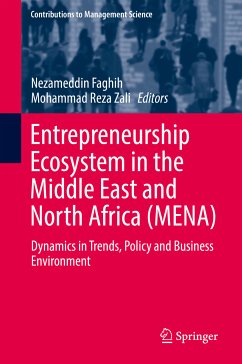Entrepreneurship Ecosystem in the Middle East and North Africa (MENA) (eBook, PDF)
Dynamics in Trends, Policy and Business Environment
Redaktion: Faghih, Nezameddin; Zali, Mohammad Reza


Alle Infos zum eBook verschenken

Entrepreneurship Ecosystem in the Middle East and North Africa (MENA) (eBook, PDF)
Dynamics in Trends, Policy and Business Environment
Redaktion: Faghih, Nezameddin; Zali, Mohammad Reza
- Format: PDF
- Merkliste
- Auf die Merkliste
- Bewerten Bewerten
- Teilen
- Produkt teilen
- Produkterinnerung
- Produkterinnerung

Hier können Sie sich einloggen

Bitte loggen Sie sich zunächst in Ihr Kundenkonto ein oder registrieren Sie sich bei bücher.de, um das eBook-Abo tolino select nutzen zu können.
This contributed volume explores and reveals the dynamics, strengths and weaknesses, trends and implications of entrepreneurship in the Middle East and North Africa (MENA) region. Presenting papers by respected experts in the field, it shares essential insights on the status quo of entrepreneurship and the opportunities and threats it faces in the MENA region. Topics range from development of entrepreneurial universities to international entrepreneurship, as well as emergent topics such as green entrepreneurship, sustainable entrepreneurship and youth entrepreneurship.
- Geräte: PC
- ohne Kopierschutz
- eBook Hilfe
- Größe: 16.04MB
![Entrepreneurship Education and Research in the Middle East and North Africa (MENA) (eBook, PDF) Entrepreneurship Education and Research in the Middle East and North Africa (MENA) (eBook, PDF)]() Entrepreneurship Education and Research in the Middle East and North Africa (MENA) (eBook, PDF)73,95 €
Entrepreneurship Education and Research in the Middle East and North Africa (MENA) (eBook, PDF)73,95 €![Observing Acceleration (eBook, PDF) Observing Acceleration (eBook, PDF)]() Peter W. RobertsObserving Acceleration (eBook, PDF)20,95 €
Peter W. RobertsObserving Acceleration (eBook, PDF)20,95 €![Startups and Innovation Ecosystems in Emerging Markets (eBook, PDF) Startups and Innovation Ecosystems in Emerging Markets (eBook, PDF)]() Startups and Innovation Ecosystems in Emerging Markets (eBook, PDF)89,95 €
Startups and Innovation Ecosystems in Emerging Markets (eBook, PDF)89,95 €![Reverse Entrepreneurship in Latin America (eBook, PDF) Reverse Entrepreneurship in Latin America (eBook, PDF)]() Reverse Entrepreneurship in Latin America (eBook, PDF)40,95 €
Reverse Entrepreneurship in Latin America (eBook, PDF)40,95 €![The Process of Social Value Creation (eBook, PDF) The Process of Social Value Creation (eBook, PDF)]() Archana SinghThe Process of Social Value Creation (eBook, PDF)73,95 €
Archana SinghThe Process of Social Value Creation (eBook, PDF)73,95 €![Entrepreneurship and Structural Change in Dynamic Territories (eBook, PDF) Entrepreneurship and Structural Change in Dynamic Territories (eBook, PDF)]() Entrepreneurship and Structural Change in Dynamic Territories (eBook, PDF)73,95 €
Entrepreneurship and Structural Change in Dynamic Territories (eBook, PDF)73,95 €![Social Innovation and Social Entrepreneurship (eBook, PDF) Social Innovation and Social Entrepreneurship (eBook, PDF)]() Luis PortalesSocial Innovation and Social Entrepreneurship (eBook, PDF)69,95 €
Luis PortalesSocial Innovation and Social Entrepreneurship (eBook, PDF)69,95 €-
-
-
Dieser Download kann aus rechtlichen Gründen nur mit Rechnungsadresse in A, B, BG, CY, CZ, D, DK, EW, E, FIN, F, GR, HR, H, IRL, I, LT, L, LR, M, NL, PL, P, R, S, SLO, SK ausgeliefert werden.
- Produktdetails
- Verlag: Springer International Publishing
- Seitenzahl: 693
- Erscheinungstermin: 12. Juni 2018
- Englisch
- ISBN-13: 9783319759135
- Artikelnr.: 56792359
- Verlag: Springer International Publishing
- Seitenzahl: 693
- Erscheinungstermin: 12. Juni 2018
- Englisch
- ISBN-13: 9783319759135
- Artikelnr.: 56792359
- Herstellerkennzeichnung Die Herstellerinformationen sind derzeit nicht verfügbar.







